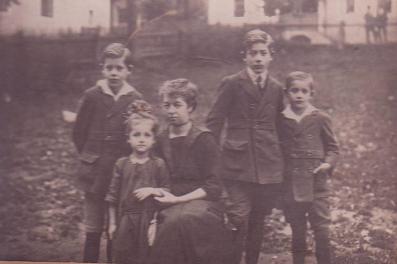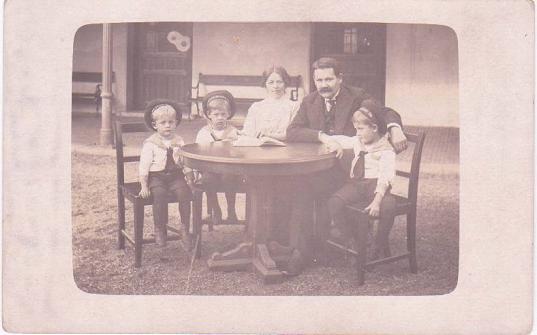Lothar Sperl was
born in
Markt Eisenstein, the third son of primary school teacher Alois Georg
Sperl and
his wife Rosalia.
Lothar,
Luis, the parents, Walter
Eisenstein,
Zelezna Ruda
today, is situated in
the Czech
Republic,
just across the border from Bavaria,
in the Bohemian
Forest. This
geographical situation and
consequent political developments in the area as well as the nature of
the land
marked Lothar Sperl’s life and art.
In 1910 Bohemia
–
with a predominantly German population - belonged to the Austro
–
Hungarian Empire. After the First World War, the area of the Bohemian
Forest
became part of the new independent Czechoslovakia
and the
Germans had
to come to terms with their minority status in the new Republic. Such
tensions
as there were, were greatly inflamed in 1938, after Hitler had annexed
Austria into the German Reich and was planning
to do the same to the so-called Sudetenland, the German –
speaking area of Czechoslovakia.
While Hitler and the British Prime Minister Chamberlain negotiated, the
Czech
population was armed and the Germans formed so – called
Freicorps
(guerrilla
troops) to defend themselves, or stir up further trouble, according to
other
sources. Markt Eisenstein was finally occupied by regular German troops
in
October 1938 and a German administration was set up.
As its name
implies, the Bohemian Forest is a largely wooded, hilly country with
beautiful landscapes, a sparse and precarious agriculture, depending on
forestry, glass manufacture, and in the 20th
century,
tourism. It
was the landscapes and the activities of the local foresters and
peasants that
became the focus of Sperl’s early work.
In
1914, his father had to
join the Austro –Hungarian army, was wounded and died in
February
1915, weeks
after the birth of his daughter.
His
widow Rosalia had to
rely on her own
strength and the support of her family to bring up her four children.
Despite
her very meagre resources, she succeeded in making them all into solid
upright
adults. Lothar says in some of his letters home how much the closeness
of the
family meant to him and his siblings.

The
widow and
her children Luis, Rosl, Walter, Lothar

